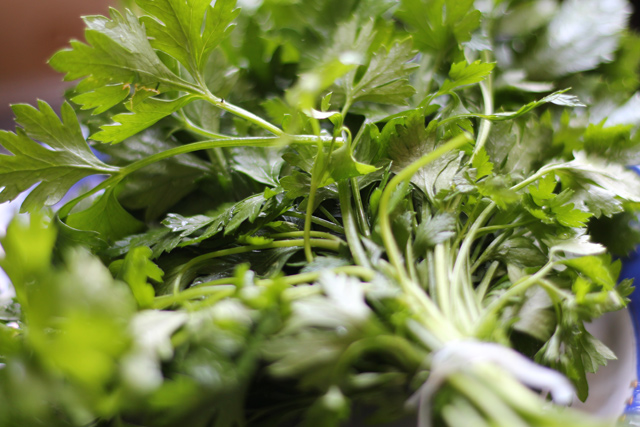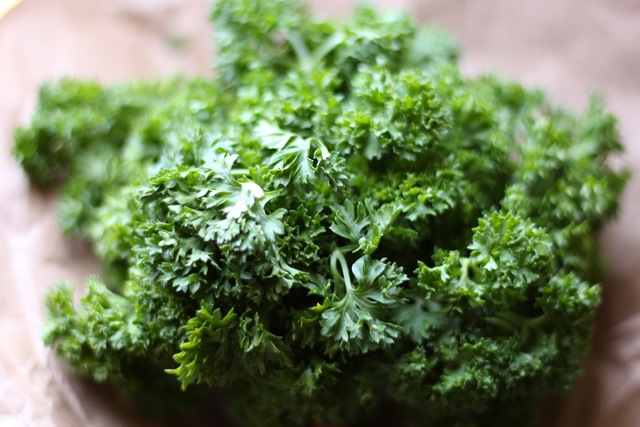Benefits of Parsley and Parsley Juice

I use parsley every day. I use it for cooking, and I use it as an addition to prepare my green shakes and juices. It is so useful that once you know about its numerous health benefits, you will be using it too.
The main purpose of this post is to help you understand how important parsley is for improving your health and how to incorporate it into your diet.
So stay tuned!
One important distinction you should know about this green vegetable is that are several types of parsley. Basically there are three main varieties:
- Common Parsley: Also called Curly Parsley. Very easy to grow if you want to grow it on your own. Fast growing, edible, decorative, and compact.
- Flat Leaf Parsley: This one is rather tall and brings in more flavor than the previous variety.
- Japanese Parsley: As the name suggests, this variety is native to Japan. It has a slight bitter flavor and has large stems and thick roots.
Table of Contents
- 1 Why is Parsley So Useful For You?
- 2 Health Benefits Of Parsley
- 3 Anti-Cancer Properties
- 4 Anti-Inflammatory Properties
- 5 Heart protective Properties
- 6 Bone Strengthening
- 7 Good for Anemia
- 8 Antibacterial Properties
- 9 Better Oral Health
- 10 Remedy For Diarrhea
- 11 Kidney Health
- 12 Liver Health
- 13 Better Hearing
- 14 Better Skin and Fewer Wrinkles
- 15 Prevents Hair Loss
- 16 Remedy For Edema
- 17 Side Effects Of Parsley
- 18 Parsley Drinks
- 19 Parsley Tea
- 20 Ingredients
- 21 How to prepare
- 22 Parsley Juice
- 23 Detox Juice
- 24 Ingredients
- 25 How to Prepare
- 26 Conclusions
- 27 References:
- 28 Related Posts
Why is Parsley So Useful For You?
If we check the nutritional profile, one nutrient stands out: Vitamin K. More than five times the recommended daily allowance!
The other abundant important nutrients found in parsley are vitamin C, vitamin A, folate, iron, and copper. While spinach is considered one of the richest plant sources of iron, parsley has two times more! Of course, normalized per serving.
All in all, just this nutritional profile alone are enough to convince you how good parsley is for you. Later on, we will see what the additional goodies are.

Let’s see now what the most important benefits of parsley are:
Health Benefits Of Parsley
Anti-Cancer Properties
Carnosol, a bio-active compound discovered found in Parsley, is held responsible for the anti-cancer properties of this green vegetable. Researchers have related this compound with the ability to fight skin, breast, prostate, and colon cancer (1).
There are numerous other important compounds found in Parsley that are basically anti-cancer. For example luteolin, apigenin, and other flavonoids.
To protect yourself, take a bunch of freshly chopped raw parsley every day.
Anti-Inflammatory Properties
In fact, the above mentioned apigenin helps fight cancer (2) because of its anti-inflammatory action. If you need to reduce inflammation at cellular lever, this is one of the most efficient natural substances.
Other than that, vitamin C helps fight inflammation. And in Parsley, you get natural vitamin C (as opposed to the isolated synthetic version found in a number of pills and capsules). You’ll get the whole integral package.
Quercetin is another important micro-nutrient. Basically a very potent antioxidant, it works perfectly together with vitamin C. It prevents the release of histamine, which is great if you suffer from allergies. It also helps fight prostate inflammation. There are some studies indicating that vitamin C improves the biological efficiency of quercetin a couple of orders of magnitude.
Heart protective Properties
Parsley is good for your heart health too. It is often combined with garlic to season your meals, which you should be doing all the time to prevent arterial hypertension. (3).
The high fiber levels in Parsley as well as its multitude of flavonoid compounds make this leafy veggie a great food for regulating your cholesterol levels. These bio-flavonoids play an important role in cholesterol synthesis and lowering of the LDL cholesterol (4).
Bone Strengthening
While Parsley has a lot of vitamin K, it is mostly of K1 type. K1 is not that important when it comes to bone health. The animal based K2 is crucial in this respect which is lacking in Parsley.
However, Parsley is vital in maintaining the proper balance between bone formation and resorption of mineral matter in the bones. The compound that does the main work here is Apigenin. (5)
Good for Anemia
Because of its high levels of iron, Parsley is good for anemia. Vitamin C helps support the absorption of iron in the body. While you rarely can or should eat parsley on its own, it can be a great addition to your green smoothies and green juices.
Antibacterial Properties
Parsley has characteristic essential oils that exhibit anti-bacterial properties. For example, it is considered a strong antibacterial vegetable when it comes to dealing with gram positive and gram negative bacteria. (6)
Better Oral Health
Parsley helps diminish bad breath. The process at work here is enzymatic deodorization. In addition, Parsley helps treat many gastrointestinal problems that may be the underlying cause of bad breath. (7)
Remedy For Diarrhea
Parsley can be used to prepare a home remedy for diarrhea. You can use all parts of the Parsley plant for this, but probably the most efficient way is to prepare tea.
Kidney Health
There are two chemical compounds in Parsley responsible for improving kidney health, apiole and myristicin. Both of them have diuretic properties and can help eliminated kidney stones. By contrast, Parsley oil is not so friendly for the kidneys and may even harm them.
Liver Health
In diabetic patients, this vegetable is capable of providing enhanced liver health and protective action. In addition, Parsley may help these patients lower glucose levels in their blood. (8)
Better Hearing
By improving the mucous flow through the body, the active compounds in Parsley help cleanse the fluids in the inner ear. This is especially true if you drink raw parsley juice.
Better Skin and Fewer Wrinkles
The Vitamin C content in Parsley is very beneficial for the skin. It has anti-aging and wounds healing benefits. Not only is Vitamin C a powerful antioxidant, but it is also the main precursor of collagen. (9) And if you want a beautiful skin, your body has to have enough collagen to repair the damage. The beta carotene content in Parsley additionally helps skin repair by converting to vitamin A.
Prevents Hair Loss
The natural nutrients in Parsley and Parsley seeds can help prevent hair loss and strengthen weak hair. This veggie can be used to prepare a tonic to help hair growth. The most important chemical compound here is apigenin, which is an antioxidant that helps regulate the expression of TGF-beta1 gene.
Remedy For Edema
Parsley is a good natural diuretic, which helps purify the body from different accumulated toxins. And, some of these toxins may be the real cause of edema in the first place. So the effect is indirect, but important. Water retention means also sodium retention, so the diuretic properties of Parsley will have an all-around effect on the condition of your body.

Side Effects Of Parsley
Even though Parsley is very good for you, there are certain side effects you should know about.
Pregnant women and breastfeeding women may experience complications when they consume Parsley in excess.
Although Parsley juice is recommended for an efficient kidney detox, people with kidney problems should be careful as there are some studies that report worsening the kidney conditions when consuming too much parsley.
In rare cases, people with hypertension should check with their doctor if the interaction of Parsley and sodium in their body may cause blood pressure increase.
Parsley Drinks
Parsley Tea
Ingredients
- one cup hot water
- ¼ cup fresh parsley leaves
How to prepare
- Rinse the parsley leaves.
- Steep the parsley leaves in boiling water for ten minutes.
- Strain the parsley leaves and enjoy the tea.
Parsley Juice
You would probably want to drink Parsley juice on its own not very often. Rather, you should mix it with other veggies and fruits.
In order to prepare your own home made Parsley juice, first thing you could try is using a centrifugal juicer. This is not a wrong procedure, but unless you have a very good juicer, it won’t work very well and you won’t be able to extract a lot of juice out of it.
What is much better for extracting Parsley juice is to use a masticating juicer. Masticating juicers are known to be able to juice any green vegetable with ease, like spinach, wheatgrass, or other leafy vegetables. As an added benefit, they work at slower speeds, which diminishes a good deal of oxidation of the nutrient content (which would otherwise occur if you were to use centrifugal juicer).

So not only are you going to get more juice, but also its quality will be superior. If you are planing to juice a lot of parsley juice, owning a good masticating juicer is a must.
Here are some ideas about what juice combination you could make:
- celery: low calorie veggie, great for cleaning and full of nutrients
- beet: beet juice purifies the blood and makes a great combination with parsley juice, adding some sweetness to the end product
- carrot: a little bit of carrot juice with its characteristic sweet taste can also be added to parsley juice to give it a more acceptable taste and contribute with its powerful nutrients like beta carotene
- cucumber: cucumber juice with its powerful diuretic properties is great to be mixed with parsley juice, plus, it tastes great
- lemon: lemon juice is our favorite fruit juice. Despite being acidic in the mouth, it is very alkaline once digested. In in addition, it can help prevent oxidation of the other fresh juices
Let’s see in more detail how we can combine these juices into one delightful drink.
Detox Juice
Ingredients
- 2 medium carrots
- 3 celery ribs
- 1/2 medium beetroot
- 1 small cucumber (if organic use the peel as well)
- 1 lemon
- 1 bunch of parsley
How to Prepare
Squeeze the lemon juice separately and pour it into the container to preserve the quality of the fresh parsley juice. Juice the other ingredients together preferably using a masticating juicer. If you have to use a centrifugal juice extractor, feed the parsley leaves squeezed between the other veggies.
Conclusions
Parsley has a great number of health benefits, but if you juice it, be aware that it can be quite potent when ingested on its own. Besides, its taste can be a bit problematic if you are not used to it. Therefore, feel free to combine it with carrot juice, lemon juice, beetroot juice, or cucumber juice. Don’t be afraid to experiment with the other juices as well.
You can buy both fresh and dried parsley. Choose the fresh one whenever you can, preferably the organic variety. Skip if the leaves are yellowish or wilted.
To your health!
References:
(1) Carnosol: a promising anti-cancer and anti-inflammatory agent.
(2) Apigenin: A Promising Molecule for Cancer Prevention

Hello! Which juicer do you prefer?
Thank you!
I prefer a masticating juicer, something like this http://www.healthjuices.net/reviews/hurom-hz-juicer/